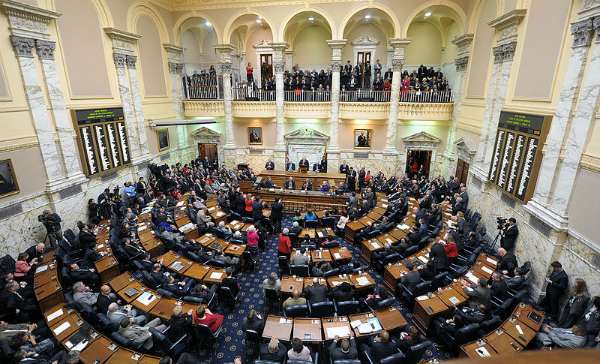A new Maryland law requires schools in the state to develop assessment teams to identify students displaying threatening behavior and creates some standards for emergency preparedness, among other things.
Maryland Governor Larry Hogan signed the bill into law Tuesday.
“No mom or dad should ever have to worry when they send their kids off to school whether their son or daughter is going to come home safely,” Governor Hogan said in a statement. “I want to thank legislators on both sides of the aisle for coming together and working with us to make our schools safer.”
Threat Assessment Programs Required
In part the law serves as guidance for school systems creating and operating threat assessment programs and training threat assessment teams.
By Sept. 1, 2019, every school system in the state must adopt student assessment policies that include:
- a process for regular assessment and intervention, including diversion and de-escalation, if an individual exhibits behavior that may pose a threat to school safety
- standards for timely response and procedures for coordination among members of the team, including referral of relevant information to appropriate authorities
- and standards and procedures for the referral of an individual for evaluation, services, or treatment when appropriate
Emergency Drills, Plans Must Be Documented
School systems will also be required to update each public school’s emergency plans by July 1, 2020.
By June 15, 2019, school systems must conduct annual safety assessments that identify and solve physical safety concerns and evaluate any patterns of safety concerns. Annual active shooter drills must also be conducted by each public school.
The law requires each school system to designate a school safety coordinator and a mental health services coordinator. The school safety coordinator will serve as a liaison between local schools and law enforcement agencies.
The mental health coordinator’s responsibilities include:
- Ensuring that a student who is referred for mental health services obtains the necessary services
- Maximizing external funding for mental health and wraparound services, as defined by the new law
- Developing plans for delivering behavioral health and wraparound services to students who exhibit specified behaviors of concern
Maryland Center for School Safety Bolstered
The operating budget of the Maryland Center for School Safety (MCSS) increased from $500,000 to $2 million annually.
The MCSS has already held a prominent role in the state’s school security efforts, but the new law increases its influence and creates a School Safety Subcabinet that will serve as its governing board.
The subcabinet will take some of the MCSS’ existing duties, but the law also adds the following responsibilities to MCSS:
- Assisting local school systems to identify resources and implementing training for students and parents about relationship violence, identifying the signs of unhealthy relationships, and preventing relationship violence
- Analyzing data on SROs and developing guidelines for local school systems regarding the assignment and training of SROs
- Certifying school safety coordinators
- Consulting with local school systems on safety evaluations
- Reviewing and comment on school emergency plans
- Reporting on life-threatening incidents that occur on public school grounds
School Resource Officer Standards
Finally, the law requires all school resource officers in the state to complete a specialized training program by Sept. 1, 2019. Law enforcement agencies may enroll their SROs in the training program currently being developed by the MCSS or a local training program that is consistent with the curriculum.
By the 2018-2019 school year, each school system in the state must submit a report showing they have an SRO stationed in each school or that adequate law enforcement coverage can be provided to each campus.
There are other standards implemented by the law but they will be developed in the coming year.
Campus Safety does not give official guidance on regulations and laws. Readers should refer to the text of all laws directly to ensure their institutions are in compliance.













